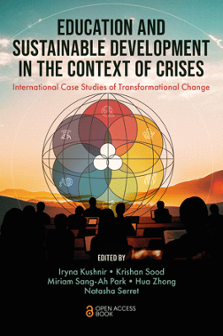
Index
ISBN: 978-1-83797-776-5, eISBN: 978-1-83797-773-4
Open Access. Publication date: 3 December 2024
Citation
(2024), "Index", Kushnir, I., Sood, K., Park, M.S.-A., Zhong, H. and Serret, N. (Ed.) Education and Sustainable Development in the Context of Crises: International Case Studies of Transformational Change, Emerald Publishing Limited, Leeds, pp. 145-151. https://doi.org/10.1108/978-1-83797-773-420241010
Publisher
:Emerald Publishing Limited
Copyright © 2025 Iryna Kushnir, Krishan Sood, Miriam Sang-Ah Park, Hua Zhong, and Natasha Serret
License
These works are published under the Creative Commons Attribution (CC BY 4.0) licence. Anyone may reproduce, distribute, translate and create derivative works of these works (for both commercial and non-commercial purposes), subject to full attribution to the original publication and authors. The full terms of this licence may be seen at http://creativecommons.org/licences/by/4.0/legalcode
INDEX
(see also Inner development goals (IDG))
- Prelims
- Part I
- Chapter 1. Introduction
- Chapter 2. Conceptualising the International Phenomenon of Crises
- Part II
- Chapter 3. Assessing the Social Impact of an American Liberal Arts University: Implications and Challenges in the Post-conflict Society of Iraqi Kurdistan
- Chapter 4. Leading the Policy Landscape of Somali Private Education System in a Conflict Zone: Views of Somali Headteachers
- Chapter 5. Towards a Sustainable and Balanced Development of Higher Education in South Korea
- Part III
- Chapter 6. Migration in Education Research: A Synthesis to Support Sustainable Development
- Part IV
- Chapter 7. The Potential of Teacher–Student Communicative Action to Overcome the Repercussions of Global Crises
- Chapter 8. The Inner Development Goals: Changing Educational Systems to Meet the Challenge of Human-Generated Global Crises
- Chapter 9. Conclusion
- Index